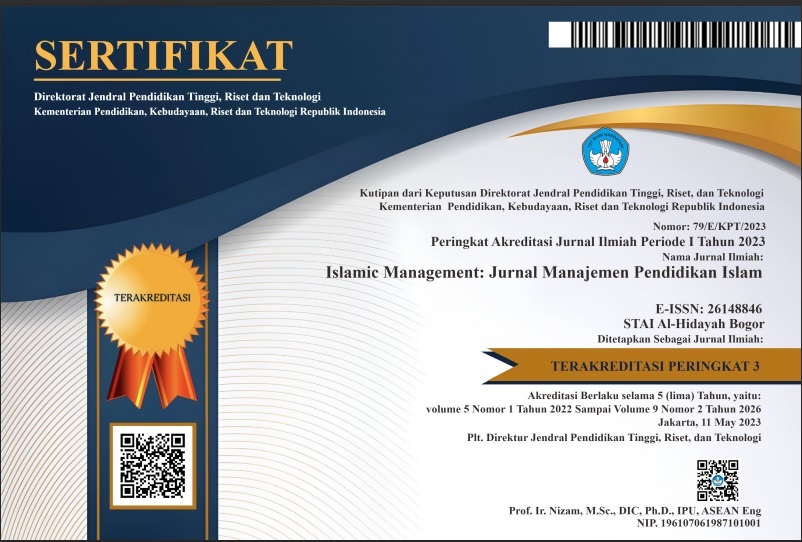EVALUATION OF THE INTEGRATED TEACHING PROFESSIONAL PRACTICE (PPKT) PROGRAM FOR STUDENTS OF EDUCATIONAL MANAGEMENT, FITK UIN SYARIF HIDAYATULLAH JAKARTA
DOI:
https://doi.org/10.30868/im.v2i02.512Abstract
This study aims to describe the suitability and benefits of the Integrated Teaching Professional Practice (PPKT) Program for Educational Management (EM) students in developing their competencies. The approach used is program evaluation using the Context-Input-Process-Product (CIPP) model which aims to collect accurate and comprehensive information so that it can be used to assist leaders to make further decisions to redesign, improve, or possibly stop the implementation of the program. The results showed that the PPKT program for EM students was not on target and needed to be stopped immediately or replaced with another program whose value was equivalent because: (1) Theoretically contextual, the PPKT was intended for students from study-based study programs so that it was not suitable for EM students; (2) From the Input aspect, students face the constraints of planning, implementing and evaluating learning, the weak competency of supervisors because their educational background is not from an education degree, teaching staff lack competency; (3) Based on the Process aspect, the PPKT implementation is not appropriate expected especially in teaching and research activities because the supervisor and tutor are not able to carry out their duties and functions properly; and (4) From the Product aspect, PPKT has not been able to improve teaching competence, educational research, educational creation and innovation. The acquisition of a high final score does not reflect their competence because more assessment is based on the subjectivity of tutors and tutors. Based on the results of the study, it was suggested that the Head of the EM Department need to reformulate the vision, mission and competency standards of graduates who are more referring to the competence of education staff, encouraging faculty leaders to immediately issue a decision to terminate the PPKT program for EM students and replace it with other programs with the same weight as PPKT.
Keywords: context, input, process, product, PPKT.References
Borang Akreditasi Program Studi Manajemen Pendidikan, FITK UIN Syarif Hidayatullah Jakarta, 2012.
FITK UIN Jakarta, Buku Panduan Praktik Profesi Keguruan Terpadu (PPKT) 2013.
SAM, M dan Asy’ary, H. (2011). Laporan Penelitian Kolektif Tracer Study Alumni Program Studi Manajemen Pendidikan FITK UIN Syarif Hidayatullah Jakarta.
Arikunto, S. dan Jabar, C.S.A. (2009). Evaluasi Program Pendidikan: Pedoman Teoritis Praktis bagi Mahasiswa dan Praktisi Pendidikan. Jakarta: Bumi Aksara.
Emzir. (2011). Metodologi Penelitian Pendidikan: Kuantitatif dan Kualitatif. Jakarta: PT RajaGrafindo Persada.
Mahmud. (2011). Metode Penelitian Pendidikan. Bandung: CV Pustaka Setia.
Sugiyono. (2009). Metode Penelitian Kuantitatif, Kualitatif, dan R & D. Bandung: Alfabeta.
Suprihatiningrum, J. (2013). Guru Profesional (Pedoman Kinerja, Kualifikasi & Kompetensi Guru). Jogjakarta: Ar-Ruzz Media.
Tayibnapis, F.Y. (2008). Evaluasi Program dan Instrumen Evaluasi untuk Program Pendidikan dan Pelatihan. Jakarta: Rineka Cipta.
Undang-Undang Republik Indonesia Nomor 14 tahun 2005 tentang Guru dan Dosen.
Wirawan. (2011). Evaluasi: Teori, Model, Standar, Aplikasi, dan Profesi. Jakarta: PT RajaGrafindo Persada.
Downloads
Published
How to Cite
Issue
Section
Citation Check
License
Authors who publish with this journal agree to the following terms:
- Authors retain copyright and grant the journal right of first publication with the work simultaneously licensed under a Creative Commons Attribution License that allows others to share the work with an acknowledgment of the work's authorship and initial publication in this journal.
- Authors are able to enter into separate, additional contractual arrangements for the non-exclusive distribution of the journal's published version of the work (e.g., post it to an institutional repository or publish it in a book), with an acknowledgment of its initial publication in this journal.
- Authors are permitted and encouraged to post their work online (e.g., in institutional repositories or on their website) prior to and during the submission process, as it can lead to productive exchanges, as well as earlier and greater citation of published work (See The Effect of Open Access).







